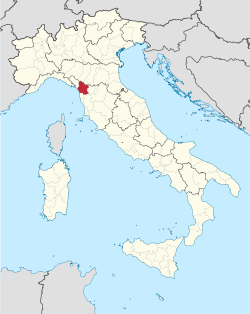Province of Lucca
| Province of Lucca | |
|---|---|
| Province | |

Laghetti di Compione in Appennino Tosco-Emiliano National Park
|
|
 Map highlighting the location of the province of Lucca within the Tuscany region of Italy |
|
| Country |
|
| Region | Toscana |
| Capital(s) | Lucca |
| Comuni | 35 |
| Government | |
| • President | Luca Menesini |
| Area | |
| • Total | 1,773 km2 (685 sq mi) |
| Population (31 January 2014) | |
| • Total | 394,318 |
| • Density | 220/km2 (580/sq mi) |
| Time zone | CET (UTC+1) |
| • Summer (DST) | CEST (UTC+2) |
| Postal code | 55110 |
| Telephone prefix | 0583 and 0584 |
| Vehicle registration | LU |
| ISTAT | 046 |
The Province of Lucca (Italian: Provincia di Lucca) is a province in the Tuscany region of Italy. Its capital is the city of Lucca.
It has an area of 1,773 square kilometres (685 sq mi) and a total population of about 400,000. There are 35 comuni (singular: comune) in the province.
Situated in northwestern coastal Italy, within Tuscany, Lucca borders the Tyrrhenian Sea to the west, the provinces of Massa e Carrara to the northwest, Pisa to the south, Pistoia to the north-east and Firenze to the east. To the north it abuts the region of Emilia-Romagna (Provinces of Reggio Emilia and Province of Modena). Access to the Tyrrhenian Sea is through municipalities such as Torre del Lago, Viareggio, and Forte dei Marmi. It is divided into four areas; Piana di Lucca, Versilia, Media Valle del Serchio and Garfagnana. Versilia is known for its extensive beaches, and there are coastal dunes in the Migliarino-San Rossore-Massaciuccoli Natural Park. The principal resorts of the province are located at Viareggio, Lido di Camaiore, Pietrasanta and Forte dei Marmi. Garfagnana is known for its wooded hills and olive trees.
Lago di Massaciuccoli is a lake with a surface area of 6.9 square kilometres (2.7 sq mi), located mainly in the municipality of Massarosa and partly in Torre del Lago, a civil parish of Viareggio. The lake was known in ancient times as the Fossis Papirianis, a name used in the Tabula Peutingeriana. The composer Giacomo Puccini lived nearby and frequently hunted around the lake; today the Puccini Festival is held there annually in celebration. The springs of Bagni di Lucca, in valley of the Lima River, a tributary of the Serchio are known from the early history of Lucca as the Vicaria di Val di Lima, and Fallopius once claimed that the springs cured his own deafness.
...
Wikipedia
